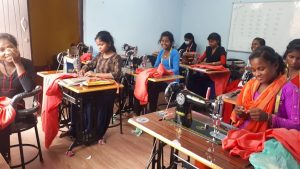 We were delighted to welcome Philip Holmes from Pipal Tree as our guest speaker this evening. Philip joined us on Zoom on Day 8 of his trek along Offa’s Dyke, a personal fundraiser for his charity. Philip commented that this had perhaps been the toughest day so far, but had the compensation of tremendous views.
We were delighted to welcome Philip Holmes from Pipal Tree as our guest speaker this evening. Philip joined us on Zoom on Day 8 of his trek along Offa’s Dyke, a personal fundraiser for his charity. Philip commented that this had perhaps been the toughest day so far, but had the compensation of tremendous views.
Philip began by thanking members of SI Bridgend for our continuing support and loyalty to the project.
He explained the reasons behind the change of name for the charity (from ChoraChori to Pipal Tree) by saying that charities evolve with circumstances and Pipal Tree is more reflective of the diversified activity of the charity.
Recent circumstances ie Brexit, Covid etc. have made it a VERY competitive landscape for charity funding and it is essential to be flexible and topical in what you do. Pipal Tree is working closely with two other organisations – Our Sansar and Guy’s Trust – both of whom are operating in the south east of Nepal in Province 2 (which covers 8 districts). This is an area of grinding poverty and very few charities want to get involved.
There is a very strong art tradition in the area using strong colours and striking images. The girls paint Pipal Tree leaves and this has also been the inspiration for the new logo.
Pipal Tree now focuses on five key areas:
- The environment and climate change: this year the wildfires in Nepal have been on an unprecedented scale. Pipal Tree is involved in a reforestation project – which is fully funded and creating a positive impact both on the environment as well as empowering local people, in particular women and girls.
- Empowering girls and women: this continues and is delivered by the social enterprise Lily’s Leaves. Tailoring training continues but with greater emphasis on moving into production more quickly. They are also engaging with the local communities and developing commercial products from local crafts, although, due to the Covid situation, outputs are on hold. Philip explained how gaining skills, learning Nepali (many in this area do not speak Nepali) and being exposed to a different world is making a huge positive difference to the lives of women in the area and empowering them to become self-sufficient.
- Community support and education focussing on marginalised people: Pipal Tree have a 5-year plan to boost attendance at the local school, with a shorter term project to refurbish the school and develop the computer room.
- Vulnerable and abused children, mental health and rehabilitation: there is a new girls refuge operating in conjunction with Our Sansar who take the lead on this aspect. A boys hostel is planned shortly.
- Disaster relief: Pipal Tree fed 28,000 people across 15 districts in 2020 – as these are from marginalised communities and not deemed to be Nepali citizens, they received no support/relief from the Nepali government and would have starved. In collaboration with Our Sansar and Guy’s Trust, they have fed 42,000 people this year across 8 districts.
Philip closed his talk by saying that he is very grateful and looks forward to continuing contact, support and friendship. President Gaynor thanked Philip for his talk and onfirmed that we would be donating a further £660 to Pipal Tree.

